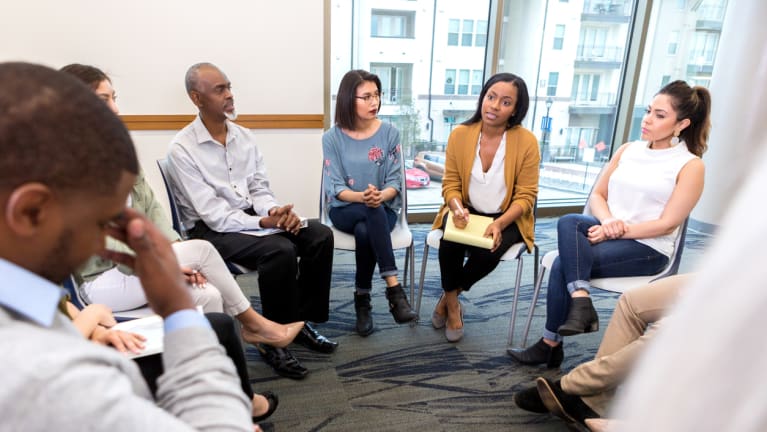

?The National Labor Relations Board (NLRB) recently confirmed that employers cannot discipline or fire workers for publicly raising concerns about racism in the workplace.
In a Feb. 27 memo, the board concluded that a medical school professor’s discussions of racism in the workplace and the medical field were protected concerted activity under the National Labor Relations Act (NLRA).
In 2016, the NLRB issued a similar advice memo, which said employees are engaged in protected concerted activity when speaking with co-workers about the employer’s discriminatory practices. It concluded that discussions about alleged racial discrimination in the workplace are inherently concerted because the perceived discrimination implicates many terms and conditions of employment and is “a matter of vital importance to employees.”
“What I think makes this latest guidance from the NLRB notable is that a significant amount of the speech at issue involved racial issues in general society and the broader medical community, as opposed to solely racial issues confined to a specific workplace,” said Mark Fijman, an attorney with Phelps Dunbar in New Orleans. “I think this shows the NLRB is adopting a broader scope” as to what it considers protected concerted activity.
Relevant Case
The NLRB’s memo outlined a case involving a former professor for the Kaiser Permanente Bernard J. Tyson School of Medicine in Pasadena, Calif., whose contract was not renewed in 2021.
The school’s dean sent an e-mail to staff and students regarding a Black man who was shot by police near the campus in 2020. That incident occurred a few months after George Floyd was killed by a police officer in Minneapolis, sparking protests across the country. The former professor and some of her colleagues felt the dean’s e-mail showed the dean’s implicit racial bias, according to the NLRB memo. Subsequently, the school directed its professors to discuss with students the legacies of power structures and institutionalized racism that result in gender bias and race bias in medicine.
The former professor facilitated a discussion with students about representation in medicine, the history of race and gender discrimination in the medical field, and how racial bias causes poor health outcomes. The group talked about the COVID-19 pandemic and how its intersection with race affected health outcomes. The former professor permitted students to discuss the dean’s e-mail. A co-worker was present in the classroom and later complained to supervisors.
Shortly afterwards, the school revoked the former professor’s teaching privileges. She talked about her suspension on Twitter and urged doctors to end racism in medicine. The school eventually didn’t renew her contract. It claimed poor performance and behavior issues were the reasons for that decision, but the NLRB found that argument to be pretextual, or a false reason.
The NLRB concluded the classroom discussion and tweets were protected concerted activity because they sought to improve terms and conditions of employment and concerned the mutual aid and protection of a group of employees. Although the former professor’s tweets discussed the school’s internal investigation of her situation, they were not mere griping because they contemplated future group action to fight for justice, the NLRB found.
“Concerted activity requires two or more employees interacting to improve working conditions,” Fijman explained. “In contrast, activity or speech by an employee that is essentially an individual gripe for solely that employee’s benefit will not be protected concerted activity. However, with the NLRB embracing an extremely broad view on concerted activity, employers should proceed cautiously.”
The former professor recently announced the settlement of her lawsuit and withdrawal of the NLRB charge against the school.
“What is crucial in this memo is that another faculty member was involved in the racial discussions. If this discussion was just with the medical school professor and the students, I do not believe the same conclusion could have been reached by the board,” said Mark Spring, an attorney with CDF Labor Law in Sacramento, Calif. “This board is going to interpret what constitutes concerted activity as broadly as possible, and before disciplining employees or implementing new workplace rules or policies, employers need to think about whether the discipline being imposed could be considered to be an interference with Section 7 rights to engage in concerted activity. This is particularly true for nonunion employers.”
Section 7 of the NLRA establishes the right of employees to engage in concerted activities for their mutual aid or protection. Concerted activity includes individual employees trying to encourage group action.
Tips for Employers
Whether in person or online, workplace discussions about race and racism can become heated. In their responses, employers need to be careful to not violate Title VII of the Civil Rights Act of 1964, which prohibits employers from discriminating against job applicants or employees based on race.
“Employers and HR should realize that when potentially racial issues arise in the workplace, they can no longer analyze or address the issue solely from a Title VII perspective,” but also need to determine if there was protected concerted activity for purposes of the NLRA, Fijman said.
The U.S. Equal Employment Opportunity Commission (EEOC) can refer cases to the NLRB and vice versa. “A discrimination case that might originate with the EEOC could also end up as a separate unfair labor practice complaint with the NLRB, bringing the unwelcome attention of two federal agencies on the employer,” Fijman said.

